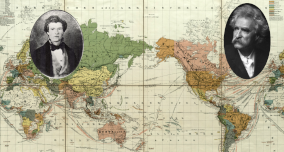Character
Beirut was technically under Turkish rule was was effectively a British and French protectorate at the time of Twain's visit. The Quaker City arrived September 9, 1867 and departed for Jaffa six days later. Many of the passengers began overland journeys from Beirut. Twain and seven others took the long trip.
Beirut, on the other hand, would be completely unrecognizable. What was once a sleepy coastal town, barely one-up from a fishing village and even then one of the least significant ones in the Holy Land, is now a fully blown commercial experience.
History of Beirut from Bædeker
In the midst of the Phoenician states were situated the ancient dominions of the Canaanitish 'Giblites', or dwellers on mountains, with their two towns of Berytus and Byblus. It is uncertain whether the name of the town is derived from its fountains (beerót), or, as others hold, from berósh, pine-tree. This place must not be confounded with Berothai (2 Sam. viii. 8; Ezek. xlvii. 16). In the Phoenician period the town seems to have been unimportant, and although it is mentioned as a harbour before the time of Alexander, is not named in the history of the campaigns of that monarch. In the second century before Christ Berytus is said to have been entirely destroyed in the course of the struggle for the crown between Tryphon and Antiochus VII., but the Romans afterwards rebuilt it, introduced a colony, and named it Julia Augusta Felix Berytus after the daughter of the Emperor Augustus. On a coin of the reign of Caracalla the town is named Antoniniana. Herod the Great, Herod Agrippa I., and Herod Agrippa II. embellished Berytus with baths and theatres. Elaborate gladiatorial combats were exhibited there, as by Titus after the destruction of Jerusalem. In the middle of the 3rd cent, a Roman school of law, which afterwards became very celebrated, began to flourish here. The trade of the place was also considerable, and the Roman empire was at that time furnished with silk fabrics from Berytus and Tyre. The silk manufacture for which these towns were famous was thence carried to Greece, and afterwards from Greece to Sicily (12th cent.). It is, however, unknown at what period the silk culture and the plantation of mulberry trees (Moras alba) were first practised in Syria, although it is certain that in the middle ages this branch of industry was already of long standing. In 529 Berytus was destroyed by an earthquake, after which the town was never rebuilt in its ancient magnificence, and its school of law was not re-established. In 600 it was still in ruins, and in 635 it was taken with ease by the Muslims. In 1125 it was captured by the Crusaders under Baldwin, and continued in their possession with little intermission down to the battle of Hattin.
Beirut was for a time the residence of the Druse prince Fakhred- din (1595-1634). This able man, by abusing the confidence of the Porte, succeeded in founding an independent kingdom for himself. He banished the Beduins and allied himself with the "Venetians , the natural enemies of the Turks. Beirut was his favourite residence. He favoured the native Christians and promoted trade. He afterwards went to the court of the Medicis at Florence to beg for assistance against the Turks, and remained nine years in Italy. On his return he made many enemies by his innovations, and by erecting a number of buildings in the European style. His son `Ali was defeated and slain by the Turks at Safed, and Beirut was taken. Shortly afterwards the emir himself was taken prisoner, and was strangled by order of Sultan Amurat at Stambul. In 1694 the Maranides, the family of the emir, were deposed and banished, after which the Sheha- bides came into power. The gradual withdrawal of power from these native princes proved a salutary policy on the part of the Turks. `Abdallâh Pasha afterwards took Beirut from the Druses (Emir Beshîr), and under its altered circumstances it at length became an important sea port, while Sidon and Tripoli declined. In 1840 the town was bombarded by the British fleet and recaptured for the Turks, but sustained no great damage. Numerous Christians have settled at Beirut, especially since the massacre of the Christians in 1860, and the place has since then greatly increased in extent.
From Murray, pages 402-6:
...
The population of Beyrout is now estimated at 45,000; one-third being Muslems, and the rest Christians, Jews, and strangers. The authorities have taken a kind of census; but with true Turkish liberality they refuse to let it be copied or even seen! The number of the inhabitants has more than doubled within the last 20 yrs.; and the town is at the present time the most prosperous in Syria; though only ranking third in point of size. It is assuming something of a European look too, with its bustling little quay, and crowded little port, and large warehouses, and shops, and beautiful suburban villas, All this prosperity is owing to foreign influence; the European mercantile firms having infused some life into the natives. The principal article of export is raw silk, the trade in which is rapidly increasing in extent and importance. In fact, Lebanon is gradually becoming one vast mulberry plantation. The total value of the exports of all kinds from the port of Beyrout in the year 1853 was 413,8391., and that of the imports 780,298/. More than one-half of the former was to Austria; and more than one-third of the latter from England. The imports at Aleppo during the same year were about 800,000l. Beyrout is every year increasing, and is at this moment, so far as foreign commerce is concerned, the first town in Syria. A large proportion of its imports are for the Damascus markets, it being now the port of that city. For the statistics and extent of the pashalic of which Beyrout is the capital, see above.
...
